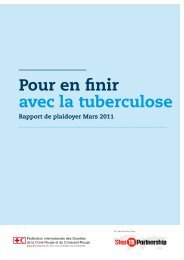Thailand - Stop TB Partnership
Thailand - Stop TB Partnership
Thailand - Stop TB Partnership
You also want an ePaper? Increase the reach of your titles
YUMPU automatically turns print PDFs into web optimized ePapers that Google loves.
Laboratory network<br />
<strong>Thailand</strong> has relatively well-equipped laboratories with few supply and maintenance problems.<br />
In addition to the National Central Reference Laboratory (NRL), there are 167 provincial<br />
and 678 district laboratories, all of which are equipped to perform smear microscopy,<br />
while approximately 85 percent are capable of performing mycobacterial cultures. 133<br />
The NTP is planning to improve the availability of <strong>TB</strong> diagnostic services by<br />
increasing capacity to conduct cultures in provincial hospitals and by strengthening culture<br />
facilities in regional <strong>TB</strong> reference laboratories. External Quality Assurance (EQA) activities<br />
cover all <strong>TB</strong> laboratories in MoPH facilities, and efforts are being made to include the private<br />
sector in the quality assurance scheme. In addition to developing laboratory capacity,<br />
the NTP is expanding its training activities to enhance the performance of <strong>TB</strong> control and<br />
laboratory staff in technical areas.<br />
Drug distribution systems<br />
Responsibility for procurement and distribution of <strong>TB</strong> drugs has been decentralized to the<br />
provincial and district levels, 134 raising some concerns about capacity to ensure proper quality<br />
control and effective management of drug stocks.<br />
Procurement and quality control<br />
Anti-<strong>TB</strong> drugs are manufactured in <strong>Thailand</strong>, but at higher cost than the drugs available on<br />
international markets. 135 The WHO has recommended that the government should renegotiate<br />
drug prices with the Government Pharmaceutical Organization (GPO) or explore<br />
alternate procurement channels to make local funding for drugs more viable, and to free up<br />
more NTP funding for other activities such as training and supervision. 136 NGOs may have a<br />
role to play in building public support for this message through media outreach efforts.<br />
Second-line drugs produced in <strong>Thailand</strong> are available free of charge to patients<br />
diagnosed with MDR-<strong>TB</strong> at provincial hospitals; cases diagnosed at the district level are<br />
referred to the provincial level for treatment services. However, international agencies have<br />
not formally assessed and approved these drugs, which raises concerns about quality control<br />
and requires donors to continue purchasing more expensive second-line drugs from quality-assured<br />
sources outside of <strong>Thailand</strong>.<br />
PUBLIC HEALTH WATCH MONITORING REPORTS 59



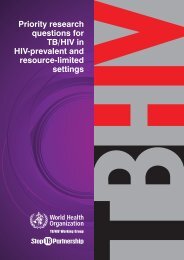
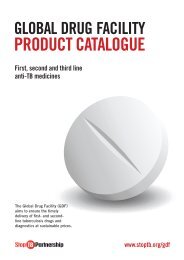
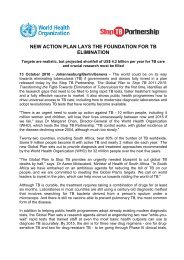
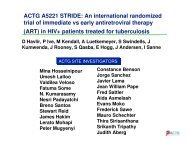
![Global Drug Facility Annual Report 2011 [.pdf] - Stop TB Partnership](https://img.yumpu.com/26788745/1/184x260/global-drug-facility-annual-report-2011-pdf-stop-tb-partnership.jpg?quality=85)

![Concept note on national stop TB partnership [.pdf]](https://img.yumpu.com/26788741/1/184x260/concept-note-on-national-stop-tb-partnership-pdf.jpg?quality=85)
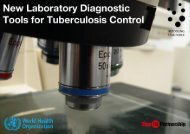
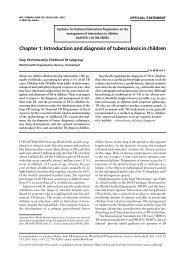
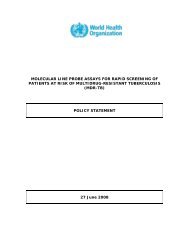
![2005 and Challenges for 2006 - 2015 [.pdf] - Stop TB Partnership](https://img.yumpu.com/26788674/1/190x245/2005-and-challenges-for-2006-2015-pdf-stop-tb-partnership.jpg?quality=85)
![Brochure (French) [.pdf] - Stop TB Partnership](https://img.yumpu.com/17234792/1/190x91/brochure-french-pdf-stop-tb-partnership.jpg?quality=85)

